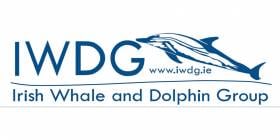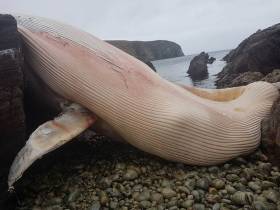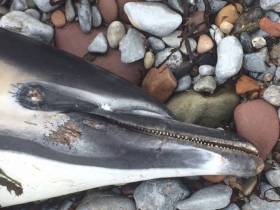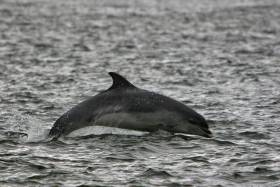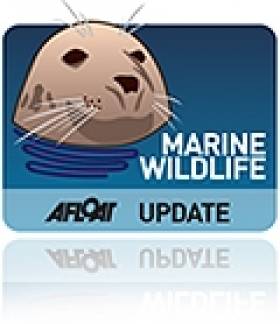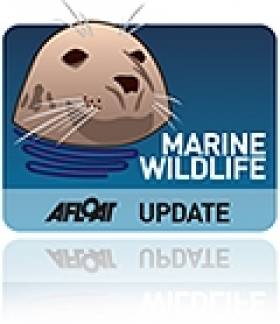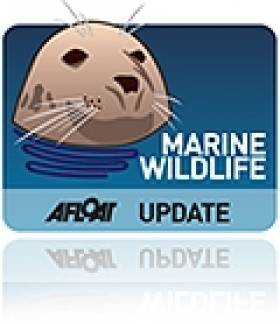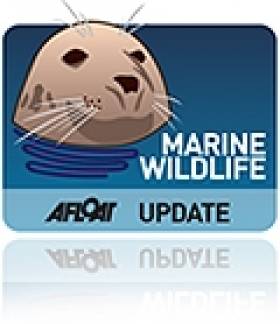Displaying items by tag: Cetaceans
Marine Notice: Cetacean Acoustic Monitoring at Arklow Bank and Gorey
The Department of Transport has been advised by University College Cork (UCC) that it intends to deploy hydrophones east of the Arklow Bank at four locations, and southwards to 15km off the bank and east of Gorey and Blackwater.
This marine science research aims to describe seasonal and diurnal occurrence of the cetaceans (the order of marine wildlife that comprises whales, dolphins and porpoise) present in the areas.
UCC plans to deploy four moorings with attached hydrophones on the seabed between the dates of Monday 5 and Saturday 17 February, subject to operational and weather constraints. The moorings will be fully recovered after three to four months for maintenance and then redeployed.
The hydrophones will be deployed in four locations in a latitudinal gradient, from east of the turbines at the Arklow Bank to 10km south of the bank, east of Gorey and Blackwater, Co Wexford.
A single vessel will be used for deploy the hydrophones: the Sharpshooter (callsign EI5069). Deployment operations will be conducted during the hours of daylight, during favourable weather conditions.
Throughout operations, the vessel will be displaying the appropriate lights and shapes as required under the COLREGS Rule 27(b). As Sharpshooter will be deploying survey equipment and moorings, the vessel will be restricted in its ability to manoeuvre, therefore all other vessels are requested to leave a wide berth.
Coordinates and a map of the survey areas as well as contact details can be found in Marine Notice No 05 of 2024, attached below.
UK’s Natural History Museum Releases Decades Of 20th Century Whale & Dolphin Stranding Records
#MarineWildlife - The UK’s Natural History Museum has made available for the first time a vast trove of whale and dolphin stranding records in British and Irish waters.
The data covers the years 1913 to 1989, filling in a significant gap before the Irish Whale and Dolphin Group’s stranding scheme began in 1991.
Over the years many entries were submitted by the coastguard, fishermen and members of the public — including a detailed record of a harbour porpoise found in Co Cork in 1913, the very first card in the data set.
PhD candidate Ellen Coombs is combing through the records to determine what picture “one of the longest systematic cetacean stranding data sets in the world” reveals for the status of cetacean species in our waters.
And already there have been some important finds, such as occasional records of deep-diving Cuvier’s beaked whales over the decades — not to mention a double stranding of narwhals in 1949.
The data also correlates with already known trends, such as the sharp decline in blue whale records with the expansion of commercial whaling in the early 20th century.
The Natural History Museum website has more on the story HERE.
Whale & Dolphin Strandings In Cork This Week ‘Only A Percentage Of What Is Actually Dead At Sea’
#MarineWildlife - Unusual weather for this time of year may be responsible for a recent spate of whale and dolphin strandings on the Cork coast in the past week.
The Irish Examiner reports that among the eight strandings were the carcass of a sperm whale on Long Strand in West Cork and a dolphin with fishing line around its beak in Schull.
However, the Irish Whale and Dolphin Group’s (IWDG) Mick O’Connell said that while the statistic was high within such a short timeframe, it was not necessarily a mystery.
“We normally get the same thing every year,” said the IWDG stranding officer. “It is usually more in the southwest and west, but this year, I suppose we have had more southeast winds, which probably explains it.”
O’Connell added that the strandings are “only a percentage of what is actually dead at sea” — and that post-mortems may “shed some light in their deaths”.
The Irish Examiner has more on the story HERE.
Fin Whale Carcass Surprises Donegal Island Residents
#MarineWildlife - Residents on Arranmore off the Donegal coast were surprised to find a rare whale carcass washed up on their island over the weekend.
According to BBC News, the 20-metre cetacean is believed to be a fin whale, an endangered species not normally spotted so close to Irish shores.
Though photo opportunities may be tempting, the public has been urged to stay away from the carcass for health and safety reasons.
Fin whales are sometimes spotted offshore, says Dave Wall of the Irish Whale and Dolphin Group (IWDG), who added that this whale was likely dead for some time before its carcass beached.
It’s not known what causes the fin whale’s death. But marine debris — especially microbeads from bathroom products – is a growing threat to all whales, dolphins and porpoise in Irish waters, as the IWDG recently reported.
Citing a new study that found marine debris (such as plastic bags and fish hooks) in the digestive tracts of 8.5% of cetaceans examined, the IWDG highlights that micro-plastics were present in the guts of every animal in the study.
“While larger marine debris has been shown to cause impaction of the gut and other complications which can lead to death, the impact of micro-plastic contamination is not known,” says the group.
“It is thought it can act as a vehicle for persistent pollutants, which adhere to the large surface area resulting in a potential increase in contaminant burdens in marine mammals.”
The IWDG has more on the study HERE.
2017 ‘Worst Year On Record’ For Whale & Dolphin Strandings
#MarineWildlife - Not even two months in and 2017 is already the worst year on record for whale and dolphin strandings, according to the Irish Whale and Dolphin Group (IWDG).
As of Friday 17 February, a whopping 56 cetacean standings had been recorded — more than half of them identified as common dolphins.
Prior to 2010, the average numbers of standings were around 22, of which five would have been common dolphins, says the IWDG’s strandings officer Mick O’Connell.
The question of what is happening to cause such a spike in strandings throughout this decade prompted a meeting between the IWDG, Government agencies and representatives from Irish and European fishing fleets earlier this week.
“There is a disconnect somewhere,” says O’Connell, “as internationally accepted visual evidence of bycatch is seen in some strandings, and post-mortem reports on five common dolphins in Mayo in 2013 reported that their deaths were likely to be due to bycatch in a pelagic trawl net, yet Irish and EU observer schemes involving pelagic trawlers reported no bycatch in commercial pelagic hauls.”
The latest stranding was recorded in Fenit, Co Kerry on Wednesday (15 February) — a dolphin alleged by locals to have been caught in the nets of a large trawler offshore before being dumped overboard, as the Irish Mirror reports.
The Irish Examiner adds that another common dolphin with blood marks was found at Ballyconneely Beach in Connemara on the same day, while two days previous the emaciated carcass of a sperm whale was found on Nethertown Beach at the most south-easterly point of Co Wexford.
Last month, a spate of marine wildlife standings on the Waterford coast was blamed on pair trawling activity in the area.
Whales & Dolphins Dominate New Atlas Of Irish Mammals
#MarineWildlife - Ireland’s whales and dolphins feature in a new atlas of the country’s wildlife, as The Irish Times reports.
The Atlas of Mammals in Ireland 2010-2015, published by the National Biodiversity Data Centre, maps the distribution of 77 mammal species both on the island and in its territorial waters.
Cetaceans account for almost a third of this number, among a whopping 68 species of whales and dolphins that frequent Irish waters.
The Irish Whale and Dolphin Group’s Dr Simon Berrow relates his long-term study of the Shannon Estuary’s thriving population of bottlenose dolphins in a book that celebrates an encouraging national habitat for species that struggle not so far from our shores.
Afloat.ie readers might remember a previous atlas concentrating on Ireland’s abundance of marine mammals that was published in 2013, and for which this new book makes a useful comparison.
New Revelations On Whale Communication
#MarineWildlife - Following yesterday's news that porpoises hunt by 'sound searchlight' comes this similarly remarkable video report from the BBC that reveals a new breakthrough in understanding how cetaceans communicate.
Studies by researchers at Washington, DC's Smithsonian Institution have identified specific differences between whales species types in the ways they navigate the oceans using sound – and they appear to be connected to the way they feed.
While toothed cetaceans such as porpoise and sperm whales echolocate using forward-focused beams of sound, some baleen whale species – the kind that sift plankton from the water for food – have a more radial perception due to the different position of their ears, shifted to accommodate their much wider mouths.
The discovery could be key to reducing the harmful effects of ocean noise on such marine wildlife caused by shipping traffic, the use of sonar and seismic surveys.
BBC News has more on the story HERE.
Porpoises Hunt By 'Sound Searchlight' Say Researchers
#MarineWildlife - How do whales, dolphins and porpoises hunt for fish? By using 'sound searchlights', according to Danish marine researchers.
As BBC News reports, the team of marine scientists at Aarhus University used underwater microphones to study the hunting behaviour of porpoises.
And they sound that the nimble cetaceans were able to adjust their echolocation abilities – using clicks and buzzes to navigate their surroundings – by switching from a narrow focus to a wide beam of sound as they closed in on their prey.
Scientists believe that other species of dolphins and whales also share this "exceptional" ability – which could provide the key to solutions that would prevent them getting trapped in commercial fishing gear.
BBC News has more on the story HERE.
See Video Highlights From 'Cetaceans On The Frontier' Voyage
#MarineWildlife - Care of the Irish Whale and Dolphin Group (IWDG), Tony Whelan produced this video documenting some of the highlights of the sixth Cetaceans on the Frontier marine research trip last month.
Researchers boarded the RV Celtic Explorer bound for the European continental shelf on a seven-day trip on which they encountered marine wildlife such as killer whales, pilot whales, dolphins and shearwaters.
The team on this expedition, made possible by the Marine Institute's funded ship time programme, also recovered scientific instruments used to monitor the presence of baleen whales and beaked whales in the area.
A gallery of images from the expedition is available on Facebook HERE.
Inishowen's Whales & Dolphins Focus Of Family Day This Saturday
#MarineWildlife - Lough Foyle area environmental group Celebrate Water is organising a family afternoon to highlight the wealth of marine wildlife off the Inishowen Peninsula this Saturday 6 September.
As the Derry Journal reports, the day will see Greencastle's coastguard station in Co Donegal open to the public with an special exhibition on the area's whales and dolphins, followed by a talk by local wildlife expert Emmett Johnston on how to spot cetacean species and identify them for the Irish Whale and Dolphin Group.
These events and more on the day follow Celebrate Water's live strandings training course last month, organised in the way of some controversy over the issue of what to do in the event of mass strandings of cetaceans on Irish shores.
The Derry Journal has more on the story HERE.



























